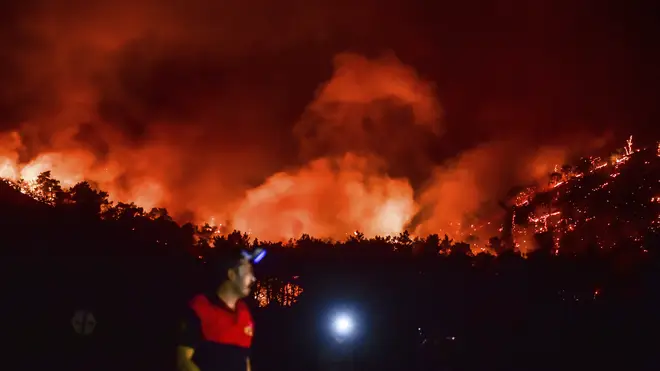
Clive Bull 1am - 4am
3 August 2021, 16:44

The fires have left eight people dead and forced thousands of residents and tourists to flee.
Turkish President Recep Tayyip Erdogan’s government is facing increased criticism over its apparent poor response and inadequate preparedness for large-scale wildfires, as flames tear through forests and villages on the country’s southern coast.
Fed by strong winds and scorching temperatures, the fires that began on Wednesday have left eight people dead, and forced thousands of residents and tourists to flee homes and holiday resorts in boats or convoys of cars and trucks.
Charred and blackened trees have replaced some of the pine-coated hills on Turkey’s Turquoise Coast while many villagers lost homes and livestock.
Firefighters are still tackling nine fires in the coastal provinces of Antalya and Mugla which are popular tourist destinations. Other active fires were reported in the provinces of Adana and Isparta.
In all, 137 fires that broke out in more than 30 provinces have been put out, officials said.
A senior forestry official described the wildfires as the worst in Turkey in living memory, though he could not say how many acres of forest land had been devoured.
He also could not estimate how long it would take the crews to put the fires out, saying strong winds were reigniting flames that had previously been brought under control.

As residents lost homes and livestock, anger turned towards the government, which admitted it did not have a firefighting aircraft fleet, and that existing planes were not in usable condition.
Opposition parties accused the government of failing to procure firefighting planes while channelling funds for construction projects they say are harmful to the environment.
Mr Erdogan’s government has also been accused of compromising firefighting efforts by refusing help from Western nations, including rival Greece, during the early stages.
Agriculture and forestry minister Bekir Pakdemirli rejected the accusation, saying the government had only refused offers of planes whose water-dumping capacities were less than five tons.

The Israeli embassy said Israel had also offered to help but Turkish officials had refused, saying the “situation is under control”.
Local mayors posted videos pleading for responses to wildfires in their areas while celebrities joined a social media campaign requesting foreign help.
The campaign drew an angry response from a senior Erdogan aide, Fahrettin Altun, who said: “Our Turkey is strong. Our state is standing strong.”
Fire-dumping planes sent from Spain and Croatia are joining aircraft from Russia, Iran, Ukraine and Azerbaijan. A total of 16 planes, 51 helicopters and more than 5,000 personnel were tackling the fires, officials said.

Health minister Fahrettin Koca said 36 people in Mugla and 11 people in Antalya were being treated in hospitals for fire-related injuries.
Authorities have launched investigations into the cause of the fires, including possible sabotage by Kurdish militants, but experts mostly point to climate change, along with accidents caused by people.
A heatwave across southern Europe, fed by hot air from North Africa, has led to wildfires across the Mediterranean, including in Italy and Greece.
In Italy, the head of the civil protection agency, Fabrizio Curcio, described wildfires affecting much of central and southern Italy as “dramatic”.
Firefighters on Tuesday were fighting seven major blazes in Calabria, Sicily, Basilicata and Puglia, employing aircraft near Matera, in Basilicata and around three fires in Calabria.

Hundreds of residents living near a forest area north of Athens fled their homes on Tuesday as a wildfire reached residential areas as Greece grappled with the heatwave.
The blaze sent smoke over the capital and prompted multiple evacuations near Tatoi, 12 miles north of Athens.
Authorities also closed the Acropolis and other ancient sites during afternoon hours as temperatures reached 42C in parts of the capital.
Officials described the heatwave as the most intense in more than 30 years.
The Fire Service maintained an alert for most of the country on Tuesday, while public and some private services shifted operating hours to allow for afternoon closures.